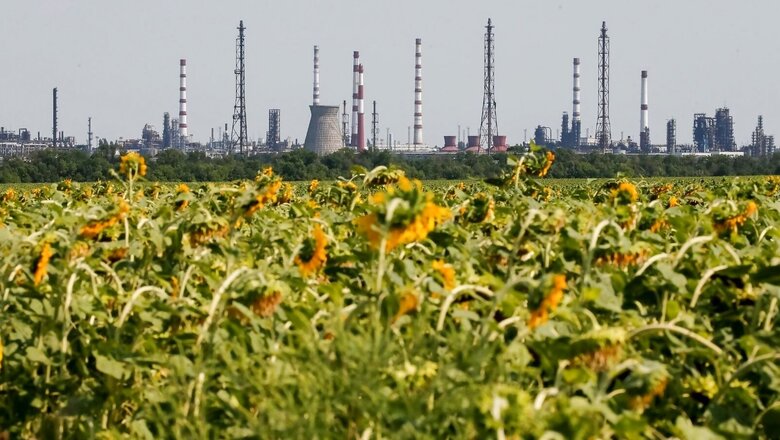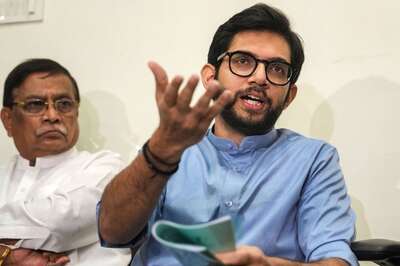
views
The war on Ukraine has begun. Russia’s President Vladimir Putin authorised “a special military operation” against the country early Thursday to eliminate what he called a serious threat. Meanwhile, the world, including India, has called for de-escalation of tensions in the region, even as a series of blasts rocked Ukraine into the beginning of the invasion.
An Air India flight to Kyiv has also turned back to New Delhi after Ukraine restricted its airspace. The safety of students and Indians in the now war-torn country is also stoking fears back home, with many still stranded. It remains to be seen what follows next, as the world watches with bated breath.
But what effect with the crisis in Ukraine have in India? According to experts, while the situation will put India in a diplomatic spot, the economic repercussions of a war will also affect the country. Meanwhile, according to some, the developments may also give China “an opportunity to act even more aggressively against India, Taiwan and the QUAD.”
Sensex Plummets, Economic Impact
Indian shares fell 3% as investors dumped risky assets after Russian troops launched missiles at several Ukrainian cities, prompting Kiev to declare a full-fledged invasion, sending oil prices higher and stoking inflation fears. The blue-chip NSE Nifty 50 index was down 3.02% at 16,548.20 and the S&P BSE Sensex was 3.07% lower at 55,477.67. Both indices were on their way to their longest losing streak since March 2020, extending losses to a seventh session.
“The looming risk of this crisis is no more there, it is a reality today,” Aishvarya Dadheech, a fund manager at Ambit Asset Management in Mumbai, told Reuters, referring to the Russian invasion of Ukraine.
“We have seen historically that with a crisis like this, the worst possible impact would be the drive in commodity prices, which for India will be on the adverse side as it could take inflation higher,” she said in the report. Nifty’s volatility index, which indicates the degree of volatility traders expect over the next 30 days in the Nifty 50, climbed to its highest since June 2020.
Oil prices surpassed $100 per barrel for the first time since 2014, as fears grew that a European war would disrupt global energy supplies. India is the world’s third-largest importer of oil, and rising global prices affect consumers while widening the country’s current account deficit.
Sunflower Oil Import
Indian sunflower oil makers are also up for trouble as the situation heats up. The edible oil shipments which stopped earlier, should resume soon from the latter, senior industry officials had told IANS in an earlier report.
They also said if the shipments do not come from Ukraine, then Russia and Argentina are there as alternate sources and there may not be any major impact on the retail prices of sunflower oil. But if there is a war between Russia and Ukraine, then the former may block the latter’s shipments. And if there are sanctions against Russia, then it will be a double whammy for India, the industry officials had told the publication.
“India imports about two lakh ton per month of sunflower seed oil and at times it goes up to three lakh tons per month. India is dependent on edible oil imports to the tune of about 60 per cent. Any global development will have an impact,” Sudhakar Desai, President, Indian Vegetable Oil Producers’ Association (IVPA), told IANS.
According to Desai, Indian importers can look at alternate sources like Russia and Argentina. Like Ukraine, Russia is also a major grower of sun flower and producer of sun seed oil. “Seventy per cent of India’s sunflower oil imports is from Ukraine, 20 per cent from Russia and 10 per cent from Argentina,” Sandeep Bajoria, CEO, Sunvin Group, a research consultancy in vegetable oils, oilseeds trade and industry, told IANS.
He said Ukraine produces about 170 lakh tons of sunflower seeds, Russia about 155 lakh tons and Argentina about 35 lakh tons. The oil yield will be about 42 per cent when crushed, Bajoria added.
“The price of oil sold by these two countries – Ukraine and Russia – is almost the same. The global price ranges about $1,500-$1,525 per ton,” Desai, also the CEO of Emami Agrotech Ltd, had said. Noting that there is sufficient stock of sunflower oil in India for the next two months, he said that for the past 20 days shipments from Ukraine were getting delayed and the vessels were getting bunched up.
“If the Russia-Ukraine trouble continues for two/three more weeks, then there will be pressure on the Indian market as the oil stock will not get replenished. We expect 1.5 lakh-2 lakh ton of sunflower seed oil imports between February-March from Ukraine,” Desai said.
According to Bajoria, not a single shipment of sunflower oil has left Ukraine in February.
Sunflower oil’s main market is in South India. According to the Indian Embassy in Ukraine, India’s bilateral trade turnover in 2019-20 was $2.52 billion (exports $463.81 million, imports $2,060.79 million).
Pharmaceuticals, reactor/boiler machinery, mechanical appliances, oil seeds, fruits, coffee, tea, spices, iron, steel, and other products are major exports from India. Sunflower oil is Ukraine’s most important export to India, followed by inorganic chemicals, iron and steel, plastics, chemicals, and other goods.
According to the Indian Embassy, India is Ukraine’s largest export destination in the Asia-Pacific region and the fifth largest overall export destination.
China to Get an Opportunity?
According to Brig Deepak Sinha (Retd.) in a report by ORF, any escalation in Ukraine will shift focus and provide China with an opportunity to act even more aggressively against India, Taiwan, and the QUAD, similar to how it got away with attacking us in 1962 while the US and the Soviet Union were focused on the Cuban Missile Crisis.
Diplomatic Dilemma
After the announcement of the invasion, India urged restraint as the Russia-Ukraine crisis. Speaking at the UNSC, India’s Permanent Representative to the United Nations TS Tirumurti said: “The Security Council had met two days ago and discussed the situation. We had called for urgent de-escalation of tensions and emphasised on sustained and focused diplomacy to address all issues concerning the situation. However, we note with regret, that the calls of the international community to give time to the recent initiatives undertaken by parties to diffuse tensions were not heeded to. The situation is in danger of spiraling into a major crisis.”
Now, India may be forced to choose a side. Russia is an important military equipment supplier and partner for India, but it also offers a sizable market for Indian exports. However, continuing to engage in military and economic engagement with Russia may subject India to the NATO and US sanctions imposed on Russia. The US CAATSA (Countering America’s Adversaries Through Sanctions Act) is already looking into India’s Rs 39,000-crore deal with Russia for five S-400 air defence systems, CNBC-TV18 reports.
India cannot abandon its strategic alliances with the United States if it were to join forces with Russia, the report said. The United States is an important part of India’s strategic challenge to counter the Chinese question in Asia. While India led the Non-Aligned Movement during the Cold War, today’s geopolitical situation makes a similar path extremely difficult, if not outright impossible, it added.
With inputs from IANS, Reuters
Read all the Latest News India and Breaking News here




















Comments
0 comment